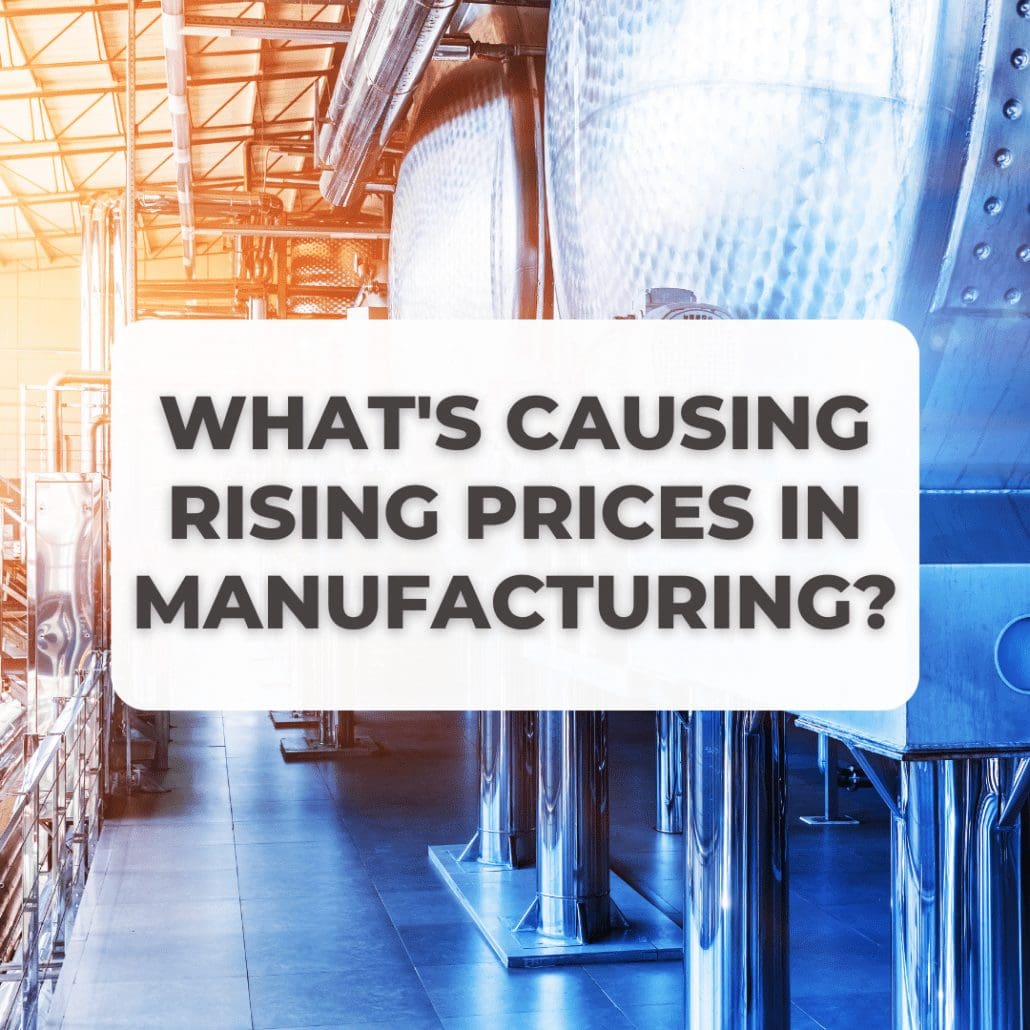
Tackling Common Misconceptions of Metal Spinning
Metal Spinning is fast becoming the go to process for manufactured goods. But did you know there are many misconceptions of the craft?
Share this article:

The manufacturing industry has been in a tailspin this past year. Production costs are rising, supply chains were disrupted by the pandemic, and demand is increasing. These factors have made it difficult for manufacturers to operate at full capacity.
As manufacturers attempt to recover from the effects of the pandemic and Brexit, they’re facing several headwinds that are worsening this situation—such as record-high material prices. These rising expenses make it harder for manufacturers to keep up with production demands while also maintaining profit margins. In some cases, these higher costs have even made products unaffordable for consumers and caused production delays due to a lack of raw materials.
When raw material prices surge, manufacturers feel the pain. When there’s a shortage of a particular material—say, copper or steel—the associated price increases can cause production delays and even force companies to stop producing altogether.
In this section we’ll look at how material shortages happen and what impact they have on manufacturing operations. We’ll also delve into the relationship between rising material prices and manufacturing operations so that you can better understand why these two things affect each other so directly in some cases (and not so directly in others).
Here’s how it works: When material prices rise, manufacturers are forced to pay more for the same amount of product — which means they either need to raise their prices or lose money on every unit sold. If they raise their prices, then consumers might be unwilling to buy from them because they don’t want to pay more for the same product than they did before. That would lead to lower sales volume and fewer profits for your business!
On the other hand, if you don’t increase your prices and keep selling at the same price as before, then you will lose money on every sale because your costs have gone up without any corresponding increase in revenue from customers paying more for goods that cost more money. In addition, if manufacturers do not pass these costs onto consumers, then they will either have to absorb these costs themselves or risk going bankrupt.
When firms were asked by the BBC what pressures they were facing to raise prices, 92% of manufacturers cited raw materials. In addition, 62% of firms expected their prices to rise in the following months with only 1% expected to decrease their prices.
In many cases, the impact of these material shortages can be mitigated with careful planning and forward-thinking policies from government officials and industry leaders alike. However, some types of shortages — such as those caused by economic factors like inflation — can’t really be avoided because they are not directly controllable by any one person or organization.
Inflation is a general increase in the price level. Inflation occurs when there is a sustained increase in the general price level, typically accompanied by an expansion of the money supply. Inflation may be caused by monetary factors, such as rapid growth of available currency or funds and/or an increase in government borrowing and spending. It may also occur if demand for goods outstrips their availability, that is, whenever there are too many buyers and not enough sellers at any given time (e.g., during winter months).
Inflation can lead to:
For some inflation is seen as a bad thing, causing companies to raise their prices which could lead to a loss of customers. For some, it could be beneficial, bringing activity to their industry that could otherwise be taken elsewhere, if prices were lower. It’s important for manufacturers to evaluate all processes and to stay up to date with industry best practices. Prioritizing critical over non-critical jobs can be another step to maximising return on investment at a time like this.
The material shortage crisis is the result of a combination of factors, including poor planning, supply chain disruption and changes in customer demand.
The UK’s exit from the EU means that supply chains have been disrupted by increased tariffs and delays at customs.
In addition, many suppliers are still seeing an increase in demand for their products, but are struggling to meet it because they cannot obtain enough raw materials or finished products.
In some cases, this has meant that manufacturers have had to start importing materials from outside of Europe, which is more expensive than sourcing them within the EU.
The problem has been compounded by the fact that many companies have not been able to plan for these changes and are now finding themselves short of essential supplies – such as plastic pellets or aluminium sheeting – which could be used in manufacturing their products.
As you can imagine, the pandemic has posed significant challenges for supply chains globally. According to the Office for National Statistics, latest data shows 16% of businesses reported global supply chain disruption; this rose to 26% when excluding firms with fewer than 10 employees. The pandemic has created a push for a digital transformation which could look like an autonomous supply chain.
The actions taken by companies varies to their specific supply chain needs, with some investing in new software tools while others focused on implementing new practices such as localizing supply and production networks. With many companies putting new digital performance management systems into effect as well as improving planning tools for certain aspects of the supply chain or broader end to end planning systems. Others made an emphasis on increasing their inventory of critical products and network to improve their own supply chain design.
While it’s evident the supply chain disruptions are significant and widespread, they will pass and the rise of a more intelligent supply chain will take effect.
The rising cost of living is having a significant effect on UK manufacturers. The high costs of energy, materials and labour are increasing the cost of production and therefore raising the price of products. This is affecting both large and small businesses alike, which has led to many companies moving their manufacturing overseas.
Manufacturers are facing increasing prices for energy, materials, and wages. In addition, the pound has fallen by around 20% since the Brexit vote, making it much more expensive for manufacturers to import raw materials and components from abroad. In turn, manufacturers must pass on these higher costs to their customers through higher prices for their products and services. This means that any company which makes its products in the UK will find it harder to compete with foreign rivals who don’t have such high costs of production.
Rising employee salaries can also contribute to higher production costs for manufacturers if they don’t keep up with inflation
Other factors contributing to higher production costs include:
The fact is no one can predict exactly when the economy will rebound. Manufacturers need to make sure they are prepared for these disruptions and be able to react quickly with the right solutions. Fortunately, there are solutions that can help manufacturers improve their material flow while also ensuring they stay within budget.
Here are a couple of examples:
Lean Manufacturing, which is a philosophy that focuses on eliminating waste from processes. When applied properly, Lean Manufacturing can help manufacturers reduce lead times and costs while improving quality and customer satisfaction. In fact, many companies have been able to increase revenue by as much as 30% after implementing Lean Manufacturing principles!
Here are some ways Lean Manufacturing principles can help your business:
Reduce lead times by improving material flow – when materials aren’t flowing smoothly through your production process you risk missing deadlines which could result in lost revenue or even worse, customers cancelling orders because they weren’t happy with how long it took for their products or parts to be delivered!
Cut costs by reducing waste – waste comes in many forms including overproduction (making more than what’s needed), waiting (waiting too long for materials), motion (moving items inefficiently), inventory (having too much inventory on hand) and transportation.
Manufacturers can also invest in inventory management software allows manufacturers to plan their inventory purchases in advance and avoid buying too much or too little of any given part. By having this kind of visibility into their inventory, manufacturers can avoid over or under ordering parts that may be hard to find when you need them most.
Inventory management software also helps to ensure that materials are available when needed. If you have just one part out of stock for even a day, it can cause major delays in shipping products out the door. This can cause frustration from customers as well as lost sales opportunities if your competitors are able to fill orders while your shipments are delayed due to lack of inventory.
GEP. (2022, April 1). 3 STRATEGIES MANUFACTURING LEADERS CAN USE TODAY TO BLUNT INFLATION. Retrieved from GEP: https://www.gep.com/blog/strategy/manufacturing-strategies-to-blunt-inflation
Harapko, S. (2021, February 18). How COVID-19 impacted supply chains and what comes next. Retrieved from EY: https://www.ey.com/en_gl/supply-chain/how-covid-19-impacted-supply-chains-and-what-comes-next
House of Commons Library. (2022, June 22). Rising cost of living in the UK. Retrieved from House of Commons Library: https://commonslibrary.parliament.uk/research-briefings/cbp-9428/
Inman, P. (2022, April 1). More UK firms expect to raise prices than at any time since 1980s. Retrieved from The Guardian: https://www.theguardian.com/business/2022/apr/01/more-uk-firms-expect-to-raise-prices-than-at-any-time-since-1980s-inflation
Knut Alicke, E. B. (2021, November 23). How COVID-19 is reshaping supply chains. Retrieved from McKinsey & Company: https://www.mckinsey.com/business-functions/operations/our-insights/how-covid-19-is-reshaping-supply-chains?cid=other-eml-dre-mip-mck&hlkid=efb04139791940499a462d0930690b27&hctky=10326800&hdpid=4e692858-bce8-4abb-8674-95b6c2f398f1
LaceUp Solutions. (2021, November 18). EFFECTS OF INFLATION IN DISTRIBUTION & MANUFACTURE INDUSTRY. Retrieved from LaceUp Solutions: https://www.laceupsolutions.com/effects-of-inflation-in-distribution-manufacture-industry/
Murray, D. A. (2022, February 16). Inflation, supply chain snarls and the incredible shrinking margin: What do manufacturers do now? Retrieved from PCW: https://www.pwc.com/us/en/industries/industrial-products/library/inflation-supply-chain-manufacturing.html
ONS. (2022, March 8). Early insights into the impacts of the coronavirus (COVID-19) pandemic and EU exit on business supply chains in the UK: February 2021 to February 2022. Retrieved from ONS: https://www.ons.gov.uk/businessindustryandtrade/internationaltrade/articles/earlyinsightsintotheimpactsofthecoronaviruspandemicandeuexitonbusinesssupplychainsintheuk/february2021tofebruary2022#:~:text=Latest%20data%20shows%2016%25%20of,reported%20global%2
Patel, D. (2021, September 20). What’s behind the rise in prices? Retrieved from Penn Today: https://penntoday.upenn.edu/news/whats-behind-inflation-wharton-school
Sultan, T. (2022, January 14). 5 ways the COVID-19 pandemic has changed the supply chain. Retrieved from World Economic Forum: https://www.weforum.org/agenda/2022/01/5-ways-the-covid-19-pandemic-has-changed-the-supply-chain/
Thomas, B. T. (2022, January 20). Inflation: Seven reasons the cost of living is going up around the world. Retrieved from BBC News: https://www.bbc.co.uk/news/business-59982702

Metal Spinning is fast becoming the go to process for manufactured goods. But did you know there are many misconceptions of the craft?

Politics within the UK plays a huge role in shaping industry. Key policies are necessary for driving innovation and more!

Boosting British Manufacturing: A £360 Million Investment Facebook Twitter LinkedIn WhatsApp Email It’s been declared ahead of the Budget that Chancellor Jeremy Hunt will announce

Units 9 & 10 Gunners Building, Limberline Road, Hilsea
Portsmouth, PO3 5BJ
(+44) 02392-666456
Sales@excellmetalspinning.com